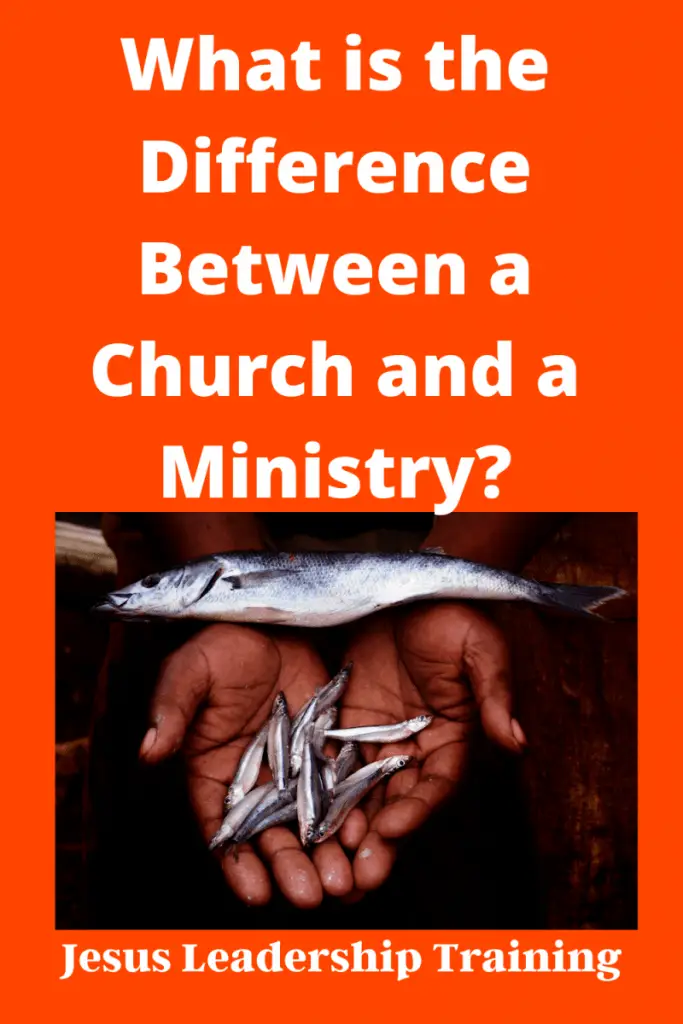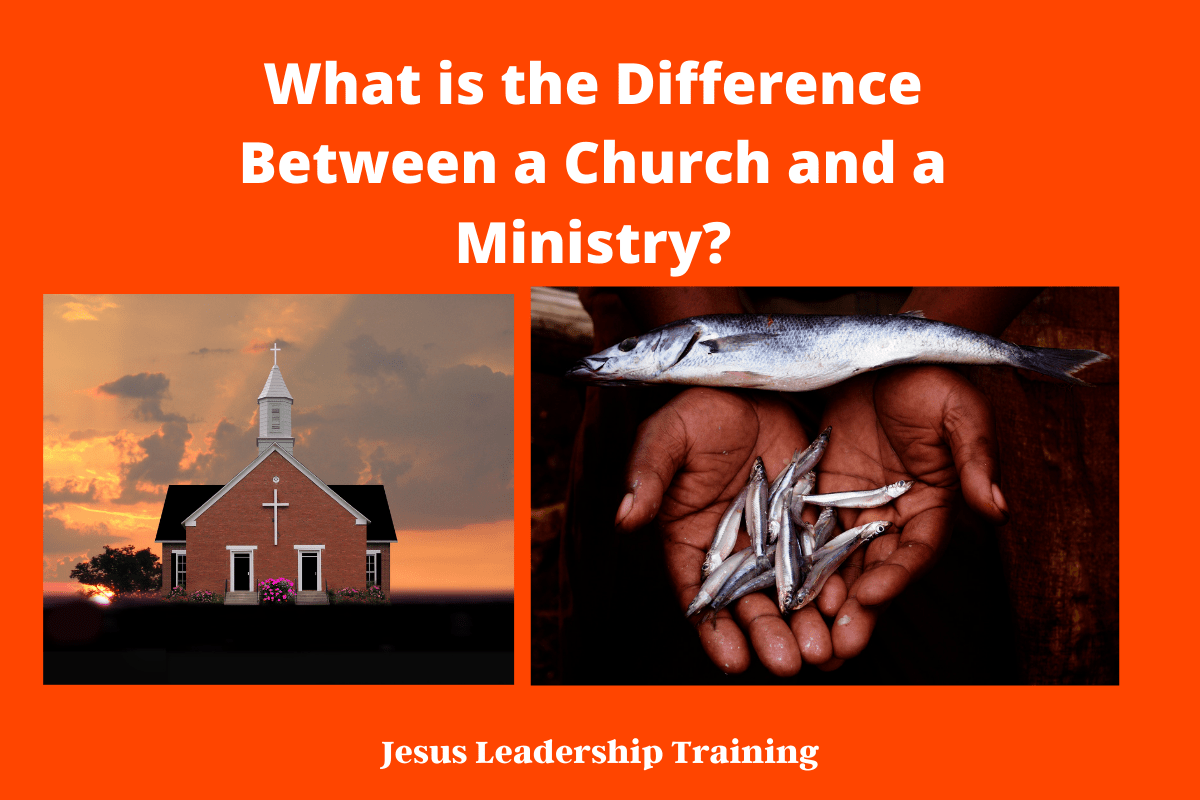Difference Between a Church and a Ministry? A Church is a Family, Body of People that have Accepted The Call of Jesus. They Worship, Pray, Sing Together. Ministries are Aeras of Service that the Body, Church does to serve others. Churches can be small, One or two gathered in my name, To Thousands of People, 3,000 People were Baptized on Pentecost. The People Vs the Service They do
Church and ministry are two terms that are different yet similar. There are many churches that call themselves ministries and we can’t tell the difference between the two. Many people who have the call of God to start a ministry usually start a church or organization that meets the needs of believers. What is the difference between a church and a ministry?
Table of Contents
What is the Church? Difference Between a Church and a Ministry
A church is the body of believers into which people are added by the Holy Spirit at the point of salvation (1 Corinthians 12:13).
12 Just as a body, though one, has many parts, but all its many parts form one body, so it is with Christ. 13 For we were all baptized by one Spirit so as to form one body—whether Jews or Gentiles, slave or free—and we were all given the one Spirit to drink. 14 Even so the body is not made up of one part but of many.
There is also the local church which is a congregation of born-again believers, baptized by immersion upon repenting toward God and expressing faith in Jesus. Such a congregation assembles for fellowship and carrying out the Great Commission of preaching the Gospel.
The church began during biblical times and is a gathering where believers hear the preaching of the Word of God and serve using their spiritual gifts (1 Corinthians 12:8-10).
8 To one there is given through the Spirit a message of wisdom, to another a message of knowledge by means of the same Spirit, 9 to another faith by the same Spirit, to another gifts of healing by that one Spirit, 10 to another miraculous powers, to another prophecy, to another distinguishing between spirits, to another speaking in different kinds of tongues, and to still another the interpretation of tongues
Most churches have services on Sunday where people come to worship and listen to a sermon. Some churches have services on Saturday or during the week. It is made up of several ministries, for example, prayer, missions, women, men, children, etc.
Before the independence of many nations, churches are the ones that sponsored most education facilities and hospitals. This is the education that enlightened locals of their rights and culminated in their fight for independence. So, the church can be credited, not just for bringing freedom from the devil but also political freedom.

The mandate of the church is articulated in Mark 16:15 and Matthew 28:19-20. Before Jesus ascended to heaven, Jesus commissioned the believers to go into all the world and preach the Gospel to every person, baptizing them in the name of the Father and the Son and of the Holy Spirit, teaching them to observe the things that the Lord had commanded them. In other words, this commission comprises evangelism and discipleship.
Evangelism becomes more effective when people who are being reached for Jesus sense concern for their welfare. Jesus did not just mind the spiritual welfare of people; He also cared about their stomachs.
Indeed we see that when He realized that the multitude of people that had been following Him was hungry, He was concerned and the upshot was the feeding of the 5,000 people according to John chapter six.
What is Vision Casting – Proverbs 29:18 says, “Where there is no vision, the people perish
Check this vision – I would follow this – Greg Gaines
The disciples too were concerned about the physical needs of believers. In fact, the reason the first deacons were chosen was to take care of issues related to serving tables so that the disciples could focus on the ministry of the Word and prayer (Acts 6:2-4).
What is a Ministry?
A ministry is an organization within the church or as a stand-alone that ministers to the needs of people. The term “ministry” today has come to also apply to business ventures that are affiliated to the church.
Examples of Ministries
- Information Ministry
- Counseling Ministry
- Music Ministry
- Youth Ministry
- Fellowship
- Outreach
- Seniors
- Teens
- Children’s Church
- Education Children / Adults
- Planning Team
- Worship Team
- Praise Team
- Video Team
- Skit / Plays Team
- Vacation Bible School Team
- Finance Team
- Mission Team
- Facilities Team
- Widow / Widows
- Welcome Team
- IT Teams
- Prayer Ministry
- Women’s Ministry
- Men’s Ministry
- Young Adults
- College Kids
- Youth Missions
- Communion Preparation
Sometimes it can even include a hotel as well, where the church has used its resources to start the business.

Also, many people who want to have churches they have control over have opted to register them as ministries. That way they run them like for-profit ventures with the pastor, or whichever name he or she chooses to give himself or herself, being the CEO.
Other times people register their churches as ministries when they lack the cover of a church that is recognized by the government. LLC or 501 (3) (c)
The role of effective ministries in a church cannot be overstated. History shows that in the past, there were, for example, the ministry of feeding that the church came up with to help it carry out its mandate of evangelism and discipleship in challenging times like during the Great Depression or during the World War.
During such times, some churches came up with places where they cooked free food so that even the down-and-out could get at least one meal a day. This provided the opportunity to share the Gospel because the food was not served before the Word was shared.
Ministries are mostly started by those who have what we call the five-fold ministry gifts of apostle, prophet, evangelist, pastor, and teacher (Ephesians 4:11 – 13).
11 So Christ himself gave the apostles, the prophets, the evangelists, the pastors and teachers, 12 to equip his people for works of service, so that the body of Christ may be built up 13 until we all reach unity in the faith and in the knowledge of the Son of God and become mature, attaining to the whole measure of the fullness of Christ.
These ministers normally start ministries where they teach the Word, conduct deliverance, sing around the world, etc.
There is no limit to the type of ministries that believers start so that they can advance the Gospel. These ministers usually get ordination from churches before they branch out to start their ministries in various locations around the world.
First Ministry in the Early Church
Acts 6; 1-7 – 1 In those days when the number of disciples was increasing, the Hellenistic Jews among them complained against the Hebraic Jews because their widows were being overlooked in the daily distribution of food.
2 So the Twelve gathered all the disciples together and said, “It would not be right for us to neglect the ministry of the word of God in order to wait on tables.
3 Brothers and sisters, choose seven men from among you who are known to be full of the Spirit and wisdom. We will turn this responsibility over to them
4 and will give our attention to prayer and the ministry of the word.”
5 This proposal pleased the whole group. They chose Stephen, a man full of faith and of the Holy Spirit; also Philip, Procorus, Nicanor, Timon, Parmenas, and Nicolas from Antioch, a convert to Judaism. 6They presented these men to the apostles, who prayed and laid their hands on them.
7 So the word of God spread. The number of disciples in Jerusalem increased rapidly, and a large number of priests became obedient to the faith.
As believers, God has given us the ministry of bringing others back to Him through sharing the Gospel with them.
“All this is from God, who reconciled us to himself through Christ and gave us the ministry of reconciliation: that God was reconciling the world to himself in Christ, not counting people’s sins against them. And he has committed to us the message of reconciliation” (2 Corinthians 5:18-19).
The assignments that God gives us on earth are to minister to others by the authority of Jesus Christ. We are ministers charged with the responsibility of reconciling unbelievers to God.
Difference between Ministry and Church | Church vs Ministry
| Aspect | Church | Ministry |
|---|---|---|
| Definition | A church is a community of believers who come together to worship God, learn about Him through His word, and support one another. It is often a physical place where these activities occur, but it can also refer to the universal body of Christ. | A ministry is a specialized activity or function within the church that is designed to achieve a specific goal. Ministries often serve particular groups within the church or community and are often led by individuals with a specific passion or calling for that area. |
| Purpose | The purpose of a church is to provide a place where believers can come together to worship God, receive teaching from the Word of God, and fellowship with other believers. It’s also a base from which believers can reach out to the surrounding community. | The purpose of a ministry is to meet specific needs within the church or community. This could include teaching children about the Bible, serving the homeless, conducting evangelistic outreaches, or any number of other specialized functions. |
| Leadership | Churches are usually led by pastors or elders who have been entrusted with the responsibility of shepherding the flock. They oversee the overall direction of the church, including its teachings and ministries. | Ministries may be led by pastors, but they are often headed up by lay leaders or volunteers with a heart for that specific area. These leaders usually work under the oversight of the church’s leadership. |
| Structure | The church is a structured entity with a defined hierarchy and governance system, usually laid out in its constitution or by-laws. It often includes various ministries as part of its organizational structure. | Ministries are components of this larger structure. They may have their own internal organization, but they fall under the overall governance of the church. |
| Scope | The church has a broad scope, encompassing the spiritual growth of its members, worship services, outreach activities, and more. It cares for the entire congregation and impacts its surrounding community. | Ministries have a narrower focus, serving specific segments of the congregation or community. They are designed to meet specific needs or achieve specific goals. |
Remember, while churches and ministries have different functions and scopes, they work together for the overall mission of spreading the Gospel and building the kingdom of God.

Here is a table that explains the primary differences between a church and a ministry:
| Parameter | Church | Ministry |
|---|---|---|
| Definition | A church is a community of believers that gather regularly for worship, typically in a specific location or building. | A ministry is a specialized group or organization focused on a particular aspect of Christian service, such as evangelism or charity. |
| Purpose | The main purpose of a church is to provide a place for believers to worship together, receive teaching, and participate in sacraments. | The purpose of a ministry varies but is generally focused on meeting specific spiritual, physical, or emotional needs within the community. |
| Structure | A church is often structured with a pastor or priest, elders, deacons, and members. | Ministries might be part of a church, independent organizations, or even informal groups. The structure often depends on the ministry’s goals. |
| Services | Churches hold regular worship services, sacraments, weddings, funerals, and other religious observances. | Ministries often provide specific services such as feeding the homeless, prison outreach, or Bible translation, depending on their focus. |
| Accountability | Churches are often accountable to a broader body like a denomination or synod. | Ministries might be accountable to a church, a board of directors, or a group of stakeholders. |
| Fellowship | Churches emphasize communal worship, fellowship, and discipleship. | While fellowship can be a part of ministries, their primary focus is often on service or outreach. |
Final Thoughts – What is the Difference Between a Church and a Ministry
Whether one starts a church or ministry, we are all doing the work of ministering to others. The fact that God attaches value to minding the physical welfare of the believers is evident from the fact that it will be rewarded.
In Matthew 25:40 we read: “And the King will answer and say to them, ‘Assuredly, I say to you, inasmuch as you did it to one of the least of these My brethren, you did it to Me.”
The service that the righteous render to others for God’s sake draws people to the Kingdom and is appreciated greatly by God
. Moreover, such a service is a reflection of our inward gratitude for the mercy and grace that God has extended to us. We ought to cheerfully avail our time and resources for the expansion of His kingdom.




